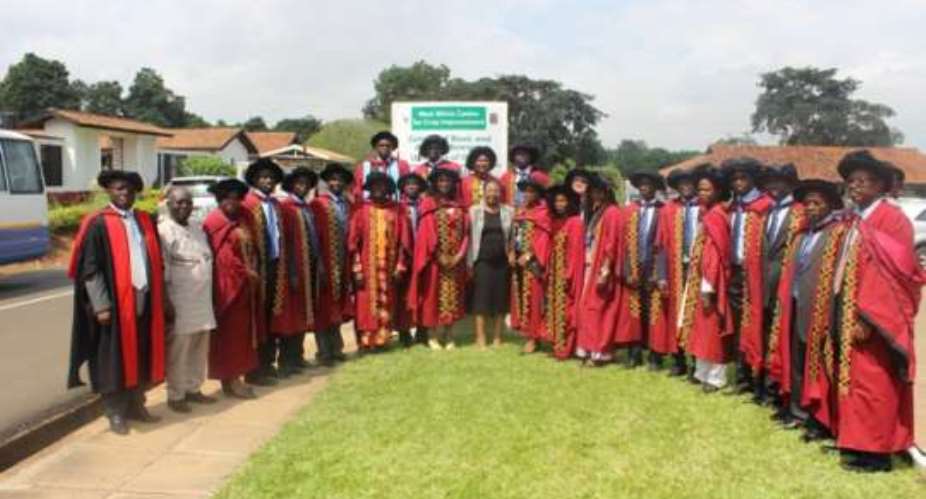Accra, July 25, GNA - The West Africa Centre for Crop Improvement (WACCI) of the University of Ghana graduated 17 PhD candidates in plant breeding at the graduation ceremony on Friday, July 21 at the Great Hall of the University of Ghana.
The 17 PhD students from seven African countries were made up of nine from Francophone, and eight were from Anglophone; of which nine were males and the rest females.
Indeed, it would be recalled that at the 2015/2016 academic year's Congregation, the Centre also presented seven PhD candidates.
In five successive years, WACCI has graduated the highest number of PhD students in the University of Ghana.
WACCI, one of the World Bank Africa Centres of Excellence, is a partnership between the University of Ghana and Cornell University, United States that was established in June 2007 with funding from the Alliance for a Green Revolution in Africa (AGRA) at the University of Ghana to train Plant Breeders in Africa working on the improvement of African crops in local environments for farmers in Africa.
AGRA provided the initial funds for the establishment of the Centre and provided full scholarships for 53 PhD students, in addition to administrative support.
Its vision is to become the foremost Centre for post-graduate training and research in crop improvement in Africa.
Professor Eric Y. Danquah, the Founding Director of WACCI, speaking in an interview with the Ghana News Agency on the sideline of the University of Ghana's Congregation, congratulated the students for their sterling performance.
He said all the graduates were returning to their home institutions to take their PhD research to the next level and work towards releasing improved and climate-smart varieties of staple crops for increased productivity in farmers' fields in seven countries in West and Central Africa.
He said a number of strategic partnerships with world class institutions globally such as Cornell University, University of Illinois, the the International Institute of Tropical Agriculture (IITA), AfricaRice, the International Crops Research Institute for the Semi-Arid Tropics (ICRISAT) and the National Agricultural Research Institutions (NARIs) in Africa had allowed WACCI to churn out in record time, these students who received quality plant breeding education.
"We acknowledge the financial support from AGRA, German Academic Exchange Service (DAAD), World Bank, Kirkhouse Trust and other institutions," he said.
"Our recently launched $ 50 million endowment fund and sustainability plan should see WACCI evolving into one of the top-tier plant breeding education institutions globally in the next decade," he added.
Prof Danquah said in 10 years, the Centre had demonstrated that working with strategic partners and taking giant strides, had produced quality PhD graduates, who were game changers and who were making history on the African Continent.
Dr Rufaro Madakadze, AGRA Programme Officer in-charge of Capacity Building, lauded WACCI for its success story in training plant breeders for Africa, as part of efforts to help address the food insecurity problem on the continent.
She said AGRA was proud of what WACCI had been able to achieve since its inception over the past decade in transforming the agricultural sector in Africa.
Two of the fresh graduates Dr Adesike Oladoyin Kolawole of Ladoke Akinlota University of Technology, Ogbomoso, Oyo State, Nigeria and Dr Solomon Olufemi Afuape of the National Root Crop Research Institute, Nigeria, expressed their gratitude to AGRA for funding their PhD programme.
Dr Kolawole, who researched on improving maize grains yield said: "I have been equipped with knowledge and skills at WACCI.
'My teaching and data analysis skills have improved. We were exposed to modern approaches in plant breeding as well advances in pedagogy. So as a lecturer, I have learnt a lot of things, I can go back and impact teaching and learning in my university. I can adequately supervise students since I am equipped to do that now. Thanks be to WACCI".
Dr Afuape, who also researched on sweet potatoes, said, the knowledge that he had gained would be used to develop new varieties to help address the food and nutrition insecurity situation in Africa.
GNA
By Iddi Yire, GNA





 Akufo-Addo spotted ordering chiefs to stand for his handshake
Akufo-Addo spotted ordering chiefs to stand for his handshake
 Akufo-Addo ‘disrespects’ every chief in Ghana except Okyenhene — NDC Communicato...
Akufo-Addo ‘disrespects’ every chief in Ghana except Okyenhene — NDC Communicato...
 Supreme Court clears way for dual citizens to hold key public positions
Supreme Court clears way for dual citizens to hold key public positions
 Be transparent, don’t suppress the truth – Prof. Opoku-Agyemang to Jean Mensa
Be transparent, don’t suppress the truth – Prof. Opoku-Agyemang to Jean Mensa
 ‘I won’t tell the world I was only a driver’s mate during challenges’ – Prof Jan...
‘I won’t tell the world I was only a driver’s mate during challenges’ – Prof Jan...
 We’ll prosecute corrupt officials of Akufo-Addo’s govt – Prof Jane Naana
We’ll prosecute corrupt officials of Akufo-Addo’s govt – Prof Jane Naana
 [Full text] Acceptance speech by Prof Jane Naana Opoku-Agyemang as 2024 NDC Runn...
[Full text] Acceptance speech by Prof Jane Naana Opoku-Agyemang as 2024 NDC Runn...
 Election 2024: Don’t be complacent, we haven’t won yet – Asiedu Nketia cautions ...
Election 2024: Don’t be complacent, we haven’t won yet – Asiedu Nketia cautions ...
 Election 2024: Stop fighting over positions in Mahama’s next govt – Asiedu Nketi...
Election 2024: Stop fighting over positions in Mahama’s next govt – Asiedu Nketi...
 Prof Jane Naana Opoku-Agyemang will restore dignity of vice presidency – Fifi Kw...
Prof Jane Naana Opoku-Agyemang will restore dignity of vice presidency – Fifi Kw...
